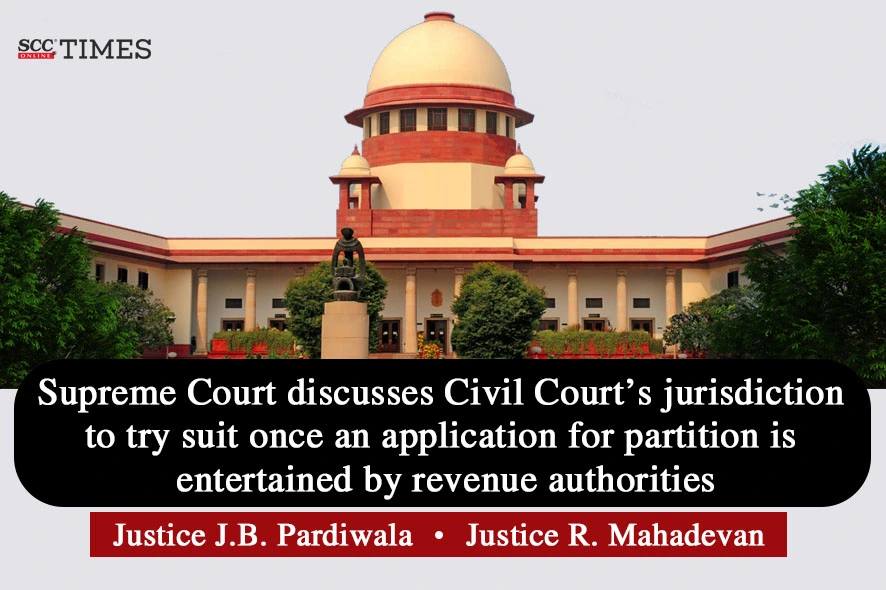Supreme Court: In a civil appeal against Gauhati High Court’s decision whereby the respondent’s second appeal (original defendants) for partition was allowed holding that the Civil Courts lacked jurisdiction in partition matters, as the revenue authorities had exclusive jurisdiction, the Division Bench of JB Pardiwala and R. Mahadevan, JJ. allowed the appeal and set aside the High Court’s decision for not being sustainable in law. The Bench held that that while the revenue authorities can give effect to partition, Civil Courts can adjudicate disputes related to property rights and title.
Background
The appellant’s case was that in 1973 the respondents/ original defendants acquired ownership of land by inheritance and took over possession of their respective shares. One of the respondents sold his share of the land to the present appellant. Soon after the possession was handed over to the appellant, the respondents tried to forcibly dispossess him from the suit property. Aggrieved by the forcible dispossession, the appellant herein instituted suit for confirmation of his right, title and interest and declaration of possession over the suit land. The Trial Court decreed the suit in favour of appellant. In the appeal preferred by the respondents, the same came to be allowed and the matter was remanded back to the Trial Court for reconsideration in light of the non-joinder of necessary parties.
In the fresh trial, the appellant’s suit was dismissed by the Munsif Court. The Appellate Court held that the appellant was entitled to a decree for declaration of right, title and interest and also joint possession of suit land along with other co-sharers. However, the first Appellate Court held that as the appellant could not be delivered possession of the suit land, he would be at liberty to seek appropriate remedy, seeking partition of the suit land. This decree passed by the first Appellate Court attained finality as the defendants’ appeal before the High Court failed.
Thereafter, the plaintiff preferred the partition suit seeking imperfect partition of the suit land under the Assam Land and Revenue Regulation, 1886 (‘the Regulation, 1886’). The Additional Deputy Commissioner declined to partition the suit land on the ground that the appellant was not in actual possession of the land and there was no consent from the other co-sharer of the land. The appeal against the said decision was allowed, holding that as in the first round of litigation declaration of joint possession was issued, the appellant was entitled to recovery of exclusive possession of his share and 05 lechas by partition thereof.
The respondents preferred the second appeal before the High Court, which came to be allowed, and the judgment and decree passed hereinabove was set aside. The High Court held that the Section 154(1)(e) of the Regulation, 1886 bars the Civil Court from exercising its jurisdiction and further that the Revenue Court had rightly rejected the prayer of partition under Section 97 as whoever seeks partition of the land must be in possession of the land. Hence, the present appeal.
Issue
Whether the High Court committed any error in taking view that the suit filed by the appellant herein was barred under Section 154(1)(e) of the Regulation, 1886.
Analysis and Decision
The Court said that partition is either perfect or imperfect. Perfect partition means division of a revenue paying estate into two or more such estates each separately liable for revenue assessed thereon. Imperfect partition means the division of a revenue paying estate into two or more portions jointly liable for the revenue assessed thereon entire estate.
Perusing the provisions under Chapter VI of the Regulation, 1886 read with the Rules framed and the Executive Instructions issued under the Assam Land Revenue Re-Assessment Act, 1936, the Court said that the Revenue authorities are competent to carry out perfect/imperfect partition of a revenue paying estate if and only if all the co- sharers give their consent for such amicable partition, i.e., when the application for such partition is made on mutual consent of the parties. The Court added that, if there is any dispute regarding the title or possession raised by any of the co-sharers, the Deputy Commissioner has to stay his hands on such process of partition and leave the matter to be decided by a competent Civil Court having jurisdiction over the matter.
Stating that, when a suit for partition is instituted seeking declaration of share and separate possession by a co-sharer based on contesting claim of title, the Revenue authorities cannot proceed to decide such a question as per the scheme of the Regulation, 1886, in the matter at hand, the Court said that the High Court was misconceived and took a contrary view that it is the Civil Court which would have no jurisdiction to try the suit once an application for partition is entertained by the revenue authorities concerning the subject-matter of the suit.
The Court said that Section 9 of the Civil Procedure Code, 1908 (‘CPC’) provides that whenever a question arises before the Civil Court whether its jurisdiction is excluded expressly or by necessary implication, the Court naturally feels inclined to consider whether the remedy afforded by an alternative provision prescribed by any special statute is sufficient or adequate. The Court explained that where exclusion of the Civil Court’s jurisdiction is expressly provided for, the consideration as to the scheme of the statute in question and the adequacy or sufficiency of the remedy provided for by it may be relevant but cannot be decisive. The Court stated that, “where exclusion is pleaded as a matter of necessary implication such consideration would be very important and in conceivable circumstances might become even decisive”.
The Court reiterated that when anything in the CPC is in conflict with special or local law or with any special jurisdiction or power conferred or in the special form of procedure prescribed by or under any other law, the CPC will not (in the absence of any specific provision to the contrary) prevail so as to override such inconsistent provisions. When there is no conflict between the special or local law and the Code, the Code will apply.
Under Section 54, the Civil Courts have jurisdiction to try and decide suits for partition or separate possession of share of estates assessed to payment of revenue to Government but have no power to execute decree passed in such suits. It can deal with a case in which a Civil Court can pass a decree but cannot itself execute it. The execution must be given effect to by the Collector.
Order XX Rule 18 of the CPC
The Court said that in a suit for partition, the Court may issue three types of decrees: preliminary decree, composite decree (partly preliminary & partly final), and final decree. The purpose of a suit for partition or separation of a share is twofold:
a. First, declaration of plaintiff’s share in the suit properties under the preliminary decree, and;
b. Secondly, division of his share by metes and bounds which would take place under the final decree.
The Court elucidated that the property may be put to sale and the proceeds would be shared among the shareholders which can be termed a final decree. In a partition suit, if the Court is unable to make a division of property by metes and bounds forthright without further inquiry, the Court will initially pass a preliminary decree which will identify the properties to be subjected to partition, define and declare the shares/rights of the parties. The prayer relating to actual division by metes and bounds and allotment is left for being completed under the final decree proceedings.
The Court noted that in Shankar Balwant Lokhande v. Chandrakant Shankar Lokhande, (1995) 3 SCC 413, it was held that where a decree relates to any immovable property and the partition or separation cannot conveniently be effected without further inquiry, then the Court should pass a preliminary decree declaring the rights of parties having interest in the property.
The Court added that a preliminary decree in a partition suit is a step in the suit which continues until the final decree is passed and the character of decree passed under sub-Rules (1) and (2) of Order XX Rule 18 of the CPC is the same. The Court also stated the decree passed under sub rule (1) of Rule 18 is not preliminary and the decree under sub-rule (2) is declared as preliminary, there is no real difference between the two since under both the provisions, the Court determines and declares the rights of parties and under both the sub rules, partition, separation or division by metes and bounds has to be effected thereafter.
Regarding the estates assessed to payment of revenue to the government (agricultural land), the Bench explained that the Courts are required to pass only one decree declaring the rights of several parties interested in the suit property with a direction to the Collector (or his subordinate) to effect actual partition or separation in accordance with the declaration made by the court in regard to the shares of various parties and deliver the respective portions to them, in accordance with Section 54 of CPC. While making the partition the Collector is bound by declaration of the rights of the parties in the preliminary decree. But the Court has no power to fetter the discretion of the Collector conferred under the law. However, the Court clarified that-
“on any issue which the Collector is not competent to decide, the civil court will have the power to dispose of. If the Collector disregards the terms of the decree, the Court is entitled to refer the case back to the Collector to re-partition the property. The Collector must actually divide the estate in the manner he thinks best keeping in mind the nature of the land as revenue paying entity and the stipulations of the decree.”
When does Section 154(1)(e) bar the jurisdiction of Civil Courts?
The Court agreed with the appellant’s submission that, the jurisdiction of the Civil Court under Section 154(1)(e) would be barred only if an imperfect partition suit is otherwise maintainable under Section 97. The Court also agreed that to maintain a suit for imperfect partition under Section 97, the appellant must fulfill two conditions:
a. the person seeking partition should be in actual possession of the property in respect of which he seeks partition, and;
b. the co-sharers may not be ready and willing to give their consent and if the person seeking partition is not in actual possession, then no other remedy is available to him except to go before the Civil Court and seek partition based on his own title as a co-owner.
The Court referred to Musstt. Rukeya Banu v. Musstt. Nazira Banu, 1927 SCC OnLine Cal 84 where it was pointed out that a partition, whether perfect or imperfect, of revenue-paying properties must be made by the Revenue authorities.
The Court said that the parties to a suit are entitled to obtain a declaration from the Civil Court that they have got the right to obtain from the revenue authorities a separation and allotment of their shares in the estate according to their proportionate rights. It is the Civil Court which will decide whether the plaintiff is entitled to seek partition and to what extent. The Court also added that the High Court itself has clarified that the bar created by Section 154(1) does not preclude suits based on title to the property from being within the jurisdiction of Civil Courts.
CASE DETAILS
|
Citation: Appellants : Respondents : |
Advocates who appeared in this case For Petitioner(s): For Respondent(s): |
CORAM :






If any land not in revenue record and will made of this property is it valid or not I am facing this type of issues Distt muzaffarnagar